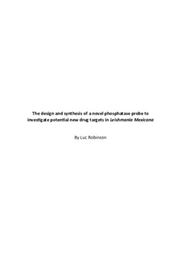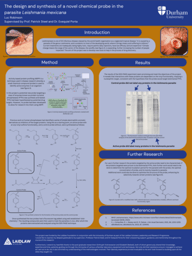What began with a pipette and a parasite has, over the course of two years, transformed into a story about persistence through failure, humility in leadership, and purpose in action. I came to see research not just as a way to find answers, but as a practice that shapes character. The lab taught me patience; the Oxford Character Project helped name the virtues; Leadership-in-Action tested them in the world. Laidlaw, for me, became an education in aligning skill with service - so that knowledge is not only gained, but applied with courage and compassion.
My Laidlaw journey began in a Durham University lab under the supervision of Prof. Patrick Steel and Dr. Exequiel Porta. The aim was to advance understanding of leishmaniasis, a devastating neglected tropical disease that causes severe disfigurement, suffering, and death across much of the developing world. Each year it affects over a million new patients, predominantly in the world’s most impoverished communities. Because those most at risk have the least ability to pay, any successful medicine is expected to yield low commercial returns, historically deterring private investment into pharmaceutical research and development. Unsurprisingly, the options available today are inadequate - often toxic, costly, and increasingly ineffective. That is why foundational research, like the work led by Prof. Steel’s group, is urgently needed.
My contribution began with five weeks of organic synthesis, drawing on my chemistry training to build a novel probe to investigate phosphatases as potential drug targets. The project then pushed me further: I handled the parasites directly and learned new chemical biology and proteomics techniques. Moving from round-bottom flasks and NMR spectra to parasite cultures and fluorescent gels was daunting, but it taught me to treat interdisciplinarity as a strength. In retrospect, that crossing of boundaries captures the ethos of the Laidlaw programme: not only to deepen expertise, but to broaden it, stepping into the unknown with curiosity, adaptability, and purpose.
Beyond the lab, the leadership workshops challenged me to turn that same curiosity inward. If synthesis taught me patience and proteomics taught me adaptability, the leadership training asked me to reflect on what kind of person I was becoming in the process. The Oxford Character Project took this further. Its emphasis on virtue ethics gave language to the qualities I had already been fumbling toward in practice: humility, integrity, courage, patience. These were not abstract ideals but habits to be purposefully cultivated through regular practice, deliberate reflection, learning from experience, and dialogue with others - supported by role models, friendships, and communities that reinforced shared values. Slowly, I came to understand leadership not as a title or position but as a way of being - grounded in character and expressed in how we relate to others.
That understanding was put to the test during my Leadership-in-Action project with The Portland Trust. Unlike the lab, where progress could be measured in yields and spectra, this was a setting defined by ambiguity, competing priorities, and the absence of clear right answers. The Trust’s mission - to promote peace and stability in the Middle East through economic development - demanded not only technical analysis but also sensitivity to culture, politics, and human relationships.
My work was embedded in their Palestine Emerging Healthcare, Partnership & Transformation strategy, which sought to reimagine healthcare provision through reforms in insurance, financing, and delivery. Some days I was drafting plans for mobile health units or reviewing models of sustainable insurance; other days I was on calls with stakeholders from Ramallah, listening to their perspectives on the systemic barriers to reform. At times I felt out of my depth, but I began to see that discomfort is not a sign of failure; it is the arena in which growth occurs.
Looking back, the Leadership-in-Action experience revealed how the different strands of the Laidlaw programme fit together. The lab had taught me discipline, resilience, and the courage to cross disciplinary boundaries. The leadership training gave me the language, strategies, and tools to extract valuable lessons from experience and make growth a routine. The Portland Trust then asked me to put it all into practice in a setting where no amount of technical skill could substitute for trust, humility, and adaptability. Together, they formed not three separate experiences but one integrated education: a journey from molecules to people, from character to action, from knowledge to service.
Even as I graduate from the formal programme into the Laidlaw Scholars Network, I believe this is just the beginning of what will be a lifelong journey of growth. The work of aligning skill with service, of applying knowledge courageously and compassionately, will continue to unfold - in new challenges, new partnerships, and new contexts - but always anchored by the experiences and values that Laidlaw has given me.
At its heart, the Laidlaw Scholarship is about more than producing good researchers - it is about nurturing principled leaders. Through this journey, I learned what that truly means.


Please sign in
If you are a registered user on Laidlaw Scholars Network, please sign in